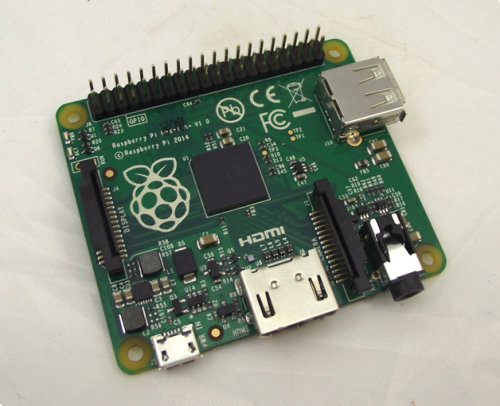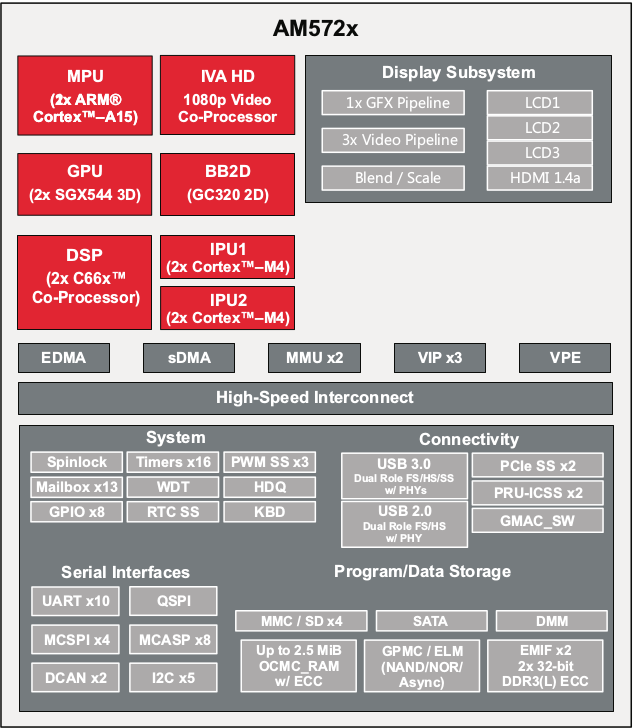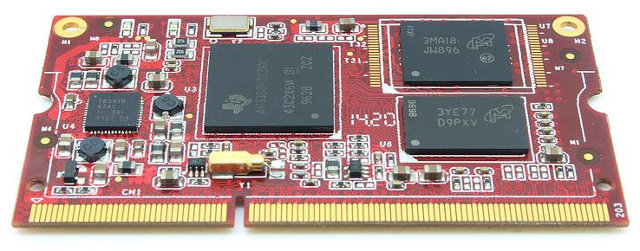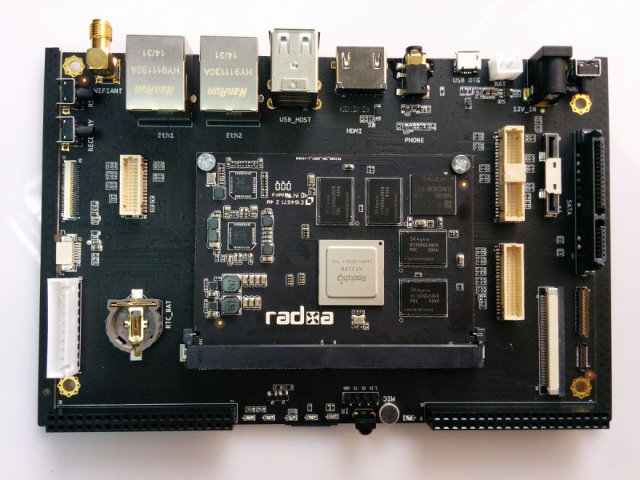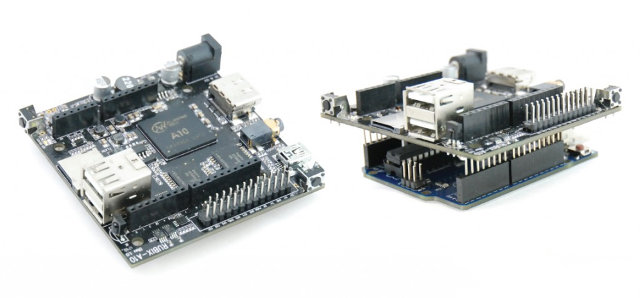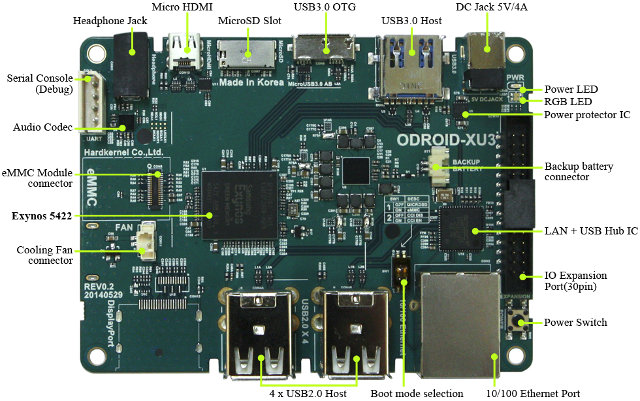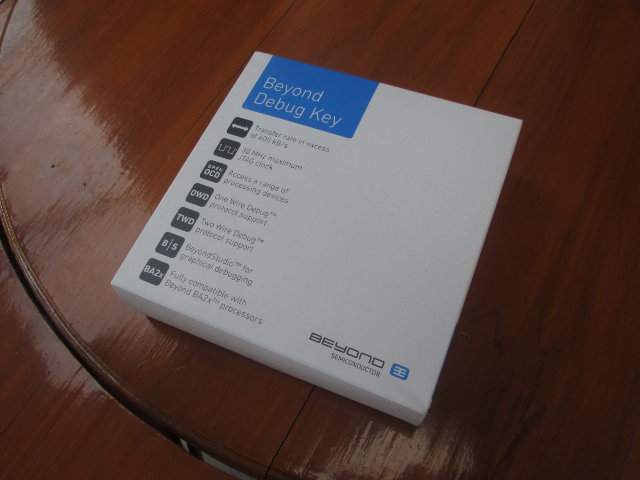After the Raspberry Pi foundation officially announced Raspberry Pi Model B+ board, it was natural to expect a Model A+ to come soon after. Based on a webpage on Element14 (now down), an update of the cheapest version of the Raspberry Pi could get announced very soon, maybe as soon as Monday. It has specifications very similar to Model A, but replaces the 26-pin GPIO connector, by a 40-pin connector, a micro SD slot takes the place of a full-sized SD slot, and power management has been improved so that it’s more efficient, and can support “power hungry” USB devices. [Update: It’s now officially announced as planned] I’ve drawn a comparison table between the latest two boards: Model B+ vs Model A+. Raspberry Pi Model B+ Raspberry Pi Model A+ SoC Broadcom BCM2835 ARM11 processor @ 700MHz with VideoCore IV GPU System Memory 512 MB (PoP) 256 MB (PoP) Storage […]
BeagleBoard-X15 Development Board To Feature TI Sitara AM5728 Dual Core Cortex A15 Processor
Before the BeagleBone and BeagleBone Black boards based on TI Sitara processor, there were BeagleBoard (-xM) boards powered by TI OMAP3 processors, and Beageboard.org and Texas Instruments are now working on their next open source hardware board with BeagleBoard-X15 powered by TI Sitara AM572 dual core Cortex A15 SoC. Since Beagleboard-X15 has not been formally announced, there’s no picture, and we don’t have the full details yet, but here are the expect technical specifications: SoC – Texas Instruments Sitara AM5728 dual core Cortex A15 processor @ 1.5 GHz, with PowerVR SGX544-MP2 3D GPU, Vivante GC320 2D GPU, 2x Cortex M4 cores, dual core C66x DSP, and IVA (Image and Video Accelerator) for 1080p video decode (H.264, VC-1, MPEG 1/2/4, AVS, etc..) System Memory – 2GB DDR3L with dual 32-bit buses Storage – 4GB eMMC, micro SD slot, and eSATA interface Video I/O – HDMI out up to 1080p60, LCD port, […]
TI Sitara based GOEMBED Systems-on-Module and Single Board Computers with BeagleBone Capes Support
GOEMBED is a startup funded by engineers previously working for Embest Shenzhen, based in Longhua district in Shenzhen, and specialized in embedded boards and modules. They currently have board and modules based on Freescale i.MX6 and Texas Instruments Sitara processors, but I’ll focus on the TI products in this post, including one of their single board computers that supports BeagleBone capes. CM3352 and CM3358 Systems-on-Module CM335x Series modules specifications: SoC – Texas Instruments Sitara Cortex A8 AM3352 @ 800 Mhz or AM3358 @ 1.0 GHz System Memory – 512 MB Micron DDR3 chip Storage – 2 to 4 GB eMMC depending on model PMU – TI TPS65910A3 Dimensions – 67.5 x 36.5 mm Temperature Range – Commercial: 0° to 70° C or Industrial: -40° to 85° C The modules are said to support Linux 3.x, Android 4.x, Ubuntu, Angstrom, Debian, WinCE 6.0/7.0, and uCOS operating systems. SBC335x Single Board Computers […]
Radxa Rock 2 Development Board Pictures and Specifications
Radxa Rock 2 is an upcoming development board based on Rockchip RK3288 quad core Cortex A12/A17 processor, which will run Android, and I would expect it to have better support for Linux desktop distributions than the original Radxa Rock board thanks to the current work done by Rockchip and Google on Chromium OS, which could bring 2D/3D graphics, and hardware video decoding to the platform. The board is not available for purchase yet, but pictures have been published, and specifications released. So the new board is comprised of a baseboard and a system-on-module (SoM), which should help Radxa’s customers design their own products, while using Radxa SoM, and doing early development on Radxa Rock 2 board. Radxa SoM specifications: SoC – Rockchip RK3288 quad core ARM Cortex-A17 [email protected] with ARM Mali-T764 GPU with support for OpenGL ES1.1/2.0/3.0, OpenCL 1.1, DirectX 11 System memory – 2GB (4GB optional), 64bit DDR3@800Mhz Storage […]
Rubix A10 is an Arduino Shield Running Linux Powered by Allwinner A10 Processor
There are plenty of ARM Linux boards featuring Arduino compatible headers such as UDOO, PcDuino, ATSAMA5D3 Xplained, etc…, and Rubix A10 looks like one of these boards, as it comes with an Allwinner A10 processor, boast Arduino compatible header, and runs Linux or Android, but instead of simply accepting Arduino shields, Rubix A10 can be used as a shield itself for Arduino (UNO?)boards. Rubix A10 specifications: SoC – Allwinner A10 ARM Cortex A8 processor @ 1.0 Ghz with Mali-400 GPU System Memory – 1GB DDR3 Storage – 4 to 8 GB MLC 64-bit ECC NAND Flash, micro SD slot up to 128 GB Video Output – HDMI 1.4 up to 1080p60 Audio I/O – HDMI, 3.5 mm jack for MIC + headphone. Connectivity – 802.11b/g/n Wi-Fi up to 150Mbps, USB – 2x USB 2.0 host interfaces, 1x mini USB OTG 2.0 port Expansions Headers Arduino compatible headers 26-pin Raspberry Pi […]
$99 ODROID-XU3 Lite Development Board Powered by Exynos 5422 Octa Core Processor
Hardkernel is known for their low cost Exynos based ODROID boards such as the $59 ODROID U3 board based on Exynos 4412 quad core SoC, and with ODROID-XU3, they also have a more powerful Octa-core Exynos 5422 board which sells for a premium price of $179. The company has now decided to offer a cheaper version of the board, which they call “ODROID-XU3 Lite” and lacks DisplayPort, the current and voltage sensors, and uses an Exynos 5422 processor clocked at 1.8/1.3 GHz instead of 2.0+/1.4 GHz for the original board. Price? A cool $99. ODROID-XU3 Lite specifications: SoC – Samsung Exynos 5422 quad core ARM Cortex-A15 @ 1.8GHz quad core ARM Cortex-A7 @ 1.3GHz in big.LITTLE configuration with Mali-T628 MP6 GPU supporting OpenGL ES 3.0 / 2.0 / 1.1 and OpenCL 1.1 Full profile System Memory – 2GB LPDDR3 RAM PoP (933Mhz, 14.9GB/s memory bandwidth, 2x32bit bus) Storage – Micro […]
Beyond Debug Key Enables JTAG & UART Debugging, Supports OpenOCD
Beyond Semiconductor, a fabless semiconductor company based in Slovenia which develops their own 32-bit BA2x IP cores, has sent me one of their development tool, namely Beyond Debug Key supporting JTAG and UART interfaces either with BeyondStudio for the company’s BA2x processor, or the open source suite OpenOCD for other processors. Since I don’t have any Beyond Semi boards, I instead configured it, and quickly tried it with Atmel SAMA5D3 Xplained ARM Cortex A5 development board, and OpenOCD (Open On-Chip Debugger). The debug tool comes in the package above describing the key features of the kit: Performance Transfer rate in excess of 600 kB/s 30 MHz maximum JTAG clock Less than 20 μW power draw from target board Compatibility Fully compatible with Beyond BA2x processor family Access any 8-bit, 16-bit, 32-bit or 64-bit processors via JTAG Works with all JTAG compliant devices Software Support OpenOCD for access to a range […]
Linaro 14.10 Release with Kernel 3.17 and Android 4.4.4, Debian ARM64 Port Almost Complete
Linaro 14.10 has just been released with Linux kernel 3.17 (baseline), Linux 3.10.54 & 3.14.19 (LSK, same versions as last month), and Android 4.4.2 & 4.4.4. Most of the work is a continuation of previous months working member hardware, and ARM64, but one particularly interesting point is that 90% of Debian packages have been built for ARM64, and the next version of Debian should have an official ARM64 port. Here are the highlights of this release: Linux Linaro 3.17-2014.10 updated linaro-android topic. In particular, CONFIG_IPV6=y is no longer the requirement for linux-linaro tree builds GATOR version 5.19 (same version as in 2014.08 release). gatord is fixed to build for ARMv8. dropped multi_pmu_v2 topic by ARM LT (no longer used) updated topic from Qualcomm LT (include IFC6410 board support) replaced integration-linaro-vexpress topic by integration-linaro-vexpress64. Starting from 2014.10 release, linux-linaro kernel tree will use the mainline support for 32-bit vexpress boards. integration-linaro-vexpress64 […]


